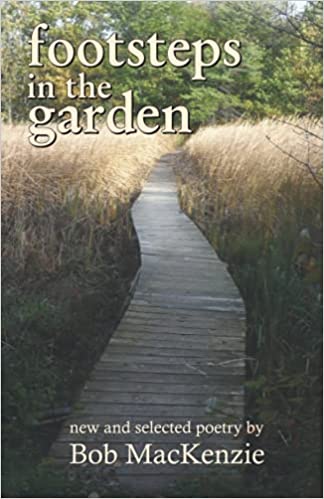
footsteps in the garden by Bob MacKenzie
Review of Poetry by Vanessa Shields
# of pages: 127
Published October 2021
Bob MacKenzie’s latest collection of poetry, footsteps in the garden is for settling in. This is a
collection that wants your time and attention for its spirographic dances with words in a plethora
of gardens, both real and imagined.
Mackenzie’s gift with words is shadowy playfulness, scooping the reader into dreamscapes held
in cages, and landscapes littered with wildlife above and below. Gracing gardens of biblical
beginnings or blooming love in bedrooms, there is much to contemplate as Mackenzie weaves
the reader in and out of spaces where:
‘...the power is
not in but
behind and before the words…’ (pg. 87, from ‘read aloud’)
Many poems take on the form of a wild-eyed, long sestina, with rich textures, heightened
emotions and riveting rhythms. Readers are at once engulfed in dream-like stories pulling from
the past, present and future musings that may or may not be lived by the writer himself, but that
boldly take centre stage in his imagination. There is a very cyclical movement within the longer
poems that connect us to life experiences both terrifying and exulting. It also feels like the writer
is searching...diving into the ‘place’ that poetry excavates as an exercise in exercising those
shadow demons that seem to always be near, in spirit or in body or in boots or in bomb blasts.
Some pieces exemplify Mackenzie’s witnessing, and resulting story-building, whereby he, for
example, sees a homeless person and weaves her backstory into view. He recycles and reuses
words in slightly shifted sentences that gust new meanings yet remain connected. The poems are
both laments and hopeful songs between different worlds with gardens of pain and sorrow or
new and lasting love. We meander between lived place and dreams between personal history or
imagined existences between childhood and adulthood, and beyond. All the while, there is a
tallying of our steady imprisonments – fear, death, pain…and love. Reader’s can find a natural
respite from the longer, shadow-driven pieces that settles into softer, shorter pieces like ‘portrait’
and ‘some times of night’.
There is a sensitivity toward the place of the poet’s voice – if it is a container for our fears, for
our sense of self, for our experiences internally and externally, can a poem bring us out of
invisibility?
‘...I am invisible; I am unheard; I am a prophet…’ (pg.38, The Dark Shimmering Deep for all the
prophets in rags)
It is as though Mackenzie uses the ‘garden’ as a container in which to express both the personal
and the collective spaces between shadow and light. He extends his gardens into cities, buildings,
cells, bedrooms, streets and more, giving an architectural ‘voice’ within a nature-driven ‘voice’
of places where seeds can root or wither.
Between the long poems looping with sestina-esque playfulness, are short poems, sonnets, and
lyrical pieces steeped in love. The entire collection, however, has an undertone of jazz. There is a
definite and deep appreciation for the musical majesty of jazz, and it reveals itself in poems like
‘this is for the jazz’ and ‘justice’, but the flow of the words, the rhythms and unpredictable yet
fitting cadence and cross-rhythms mirror the vibe and eloquence of jazz music.
To conclude, footsteps in the garden is footsteps into Mackenzie’s own jazz-tastic, lyrical
deep-dive into his shadows, and at its essence, the brightness of hope as the light discovers and
embeds itself even the darkest spaces.
“...what dark shadows might threaten
the slender darts of the sun melt
or soften to nothing more dangerous
than the sodden leaves underfoot…” (pg. 114, from ‘the obelisk’)
